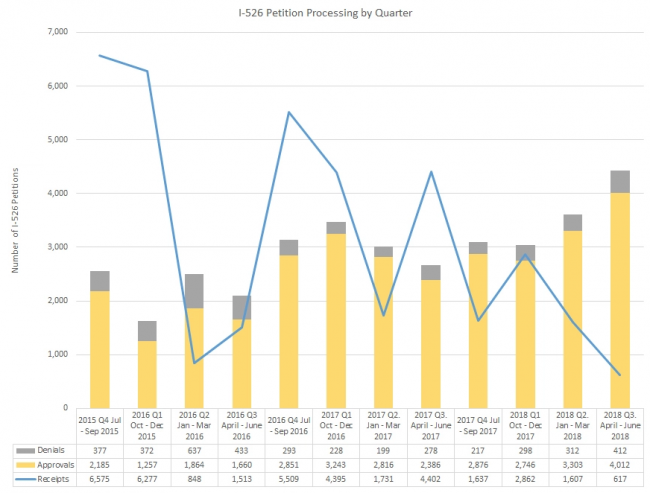Only 617 new EB-5 immigration petitions were filed with United States Citizenship and Immigration Services in the third quarter of 2018, the lowest quarterly figure for new applications in at least five years, according to data released by USCIS this week.
Last quarter, there were 1,607 applications and 4,402 a year ago. The drop comes as Chinese investors increasingly express their dissatisfaction with long wait times for visas. It’s led some to lawyer up to renegotiate the returns on their $500,000 investments in American real estate developments, and in some cases, sue the regional investment centers that handled them.
The previously strong demand from China for EB-5 green cards and the quotas that limit annual EB-5 immigrants by country of origin, have contributed to USCIS’ large backlog of applicants. The delays have only gotten worse with time, which has also discouraged some developers and fundraisers from going forward with new offerings, said Debbie Klis, an attorney in the Polsinelli law firm’s securities and corporate finance practice.
“I think the wait times have slowed the interest in China but it’s also [developers] anticipating a slowness,” she said. “As soon as you tell people there’s a slowdown, they’re not trying as much.”
At a recent industry conference, Department of Homeland Security official Charles Oppenheim presented the government’s official wait time estimations for several countries. For China, the wait is 14 years, which is about where most industry experts have long-suspected it would be. It’s much shorter in other countries where EB-5 is more recently becoming popular for wealthy investors, such as Brazil (1.5 years) and India (5.7 years). Klis said the pivot from China to these areas, where the program is still gaining interest, could also explain the drop in overall petitions.
In a recent blog post on her website, EB-5 business writer and analyst Suzanne Lazicki notes that although the number of new petitions coming in has dropped off, USCIS is processing old ones quicker than before, with a “record-breaking number” of 4,424 processed applications, also known as I-526 petitions, this past quarter.

In an email, Lazicki said that once the official numbers for July through September — what USCIS refers to as the “fourth quarter” — are released, new petitions could bounce back. That’s because there’s often a surge in applications in September, the month in which the program has in recent years been scheduled to sunset, pending reauthorization by Congress.
First ushered into existence by Congress in 1992, the EB-5 program is technically a “pilot,” meaning it must be regularly reauthorized (though lobbyists have for years pushed for permanent status). A full reauthorization and reform package for the program has been delayed for multiple budget cycles now, and lawmakers have instead opted for continuing resolutions that keep the program, which has been the subject of numerous securities fraud scandals, active without significant reforms.
The program was mostly recently renewed through Dec. 7.
